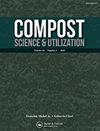Bio-Waste Recycling in Germany – Further Challenges
IF 2
4区 农林科学
Q3 ECOLOGY
引用次数: 39
Abstract
ABSTRACT German biodegradable waste is collected separately, recycled and ecologically and economically sound used. Around the world biodegradable waste in landfills is the main factor for greenhouse gas emissions. This environmental impact can be significantly reduced by the separate collection and use of organic waste. The separate collection of bio-waste is also a precondition for reutilizing of organic matter and nutrients. Only from separately collected bio-waste it is possible to produce high-quality compost and digestate, which are suitable for agricultural or horticultural use. The separate collection of bio-waste from households affects the amount and composition of the residual waste. By separating bio-waste, the remaining amount of waste is reduced up to a third. At the same time the residual waste contains less wet ingredients, which facilitate the waste sorting and makes the treatment in waste incineration plants more effective or even possible. Both, the recycling of compost and digestate on soils, as well as the energy recovery of bio-waste, contribute to climate protection and resource conservation. The operation of the treatment plants determines how much of the greenhouse gases methane, nitrous oxide and ammonia is released during the process. Some plant operators need to be awakened and their awareness of climate-relevant emissions from their bio-waste treatment plants has to be raised. Also the amount of collected organic waste should be further reinforced. In Germany since 2015 the separate collection of bio-waste has to improve!德国的生物废物回收-进一步的挑战
摘要:德国可生物降解废物是单独收集、回收和生态经济合理使用的。在世界各地,垃圾填埋场中的可生物降解废物是温室气体排放的主要因素。通过单独收集和使用有机废物,可以显著减少这种环境影响。生物废物的单独收集也是有机物和营养物质再利用的先决条件。只有从单独收集的生物废物中才能生产出适合农业或园艺用途的高质量堆肥和消化物。从家庭中单独收集生物废物会影响残余废物的数量和成分。通过分离生物废物,剩余的废物数量减少了三分之一。同时,残余垃圾含有较少的湿成分,这有助于垃圾分类,并使垃圾焚烧厂的处理更加有效甚至可能。堆肥和土壤消化物的回收利用,以及生物废物的能源回收,都有助于气候保护和资源节约。处理厂的运行决定了在这个过程中释放出多少温室气体甲烷、一氧化二氮和氨。需要唤醒一些工厂经营者,提高他们对生物废物处理厂气候相关排放的认识。此外,应进一步增加收集的有机废物的数量。自2015年以来,德国必须改进生物废物的单独收集!
本文章由计算机程序翻译,如有差异,请以英文原文为准。
求助全文
约1分钟内获得全文
求助全文
来源期刊

Compost Science & Utilization
农林科学-生态学
CiteScore
4.10
自引率
0.00%
发文量
0
审稿时长
>36 weeks
期刊介绍:
4 issues per year
Compost Science & Utilization is currently abstracted/indexed in: CABI Agriculture & Environment Abstracts, CSA Biotechnology and Environmental Engineering Abstracts, EBSCOhost Abstracts, Elsevier Compendex and GEOBASE Abstracts, PubMed, ProQuest Science Abstracts, and Thomson Reuters Biological Abstracts and Science Citation Index
 求助内容:
求助内容: 应助结果提醒方式:
应助结果提醒方式:


